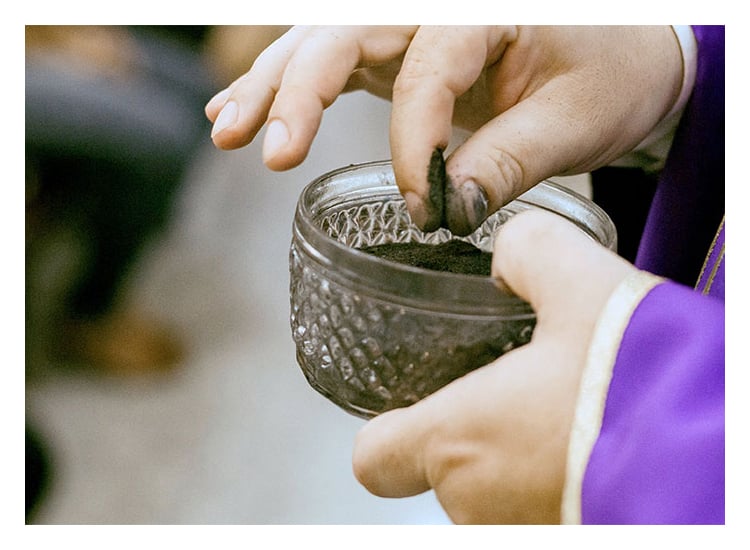
Ash Wednesday: The Law of Prayer is the Law of Belief
Reflection by Fr. Seamus Hogan
We have a special axiom in the Catholic Church. It is a special statement that is very ancient. It says, "Lex orandi, lex credenda," and it means that the law of prayer is the law of belief. What it is trying to say is that in prayer, whether liturgical or private, we discover a great deal of theology which informs us about God and our relationship to him. Take a Eucharistic prayer for instance, or the Our Father, or the Hail Mary, these prayers are full of profound theological statements.
On Ash Wednesday, we say a prayer for the blessing of the ashes, and there we find a great deal of theology, too. If we look at that prayer, we discover the very meaning of Lent because it tells us that three things are important during Ash Wednesday and the entire Lenten season.
The first thing that it tells us is that we are meant to have a penitential and humble spirit. By being penitential and humble, sorry for our sins, we're actually opening our hearts to receive God's mercy, and attracting the mercy of God into our lives as well.
The second thing that the beautiful blessing is telling us is that prayer is vital. Prayer is important. Perhaps we have not been praying as robustly as we should. Well now's the time to double down on that and recommit ourselves to prayer. Or if we are praying very well, maybe it's time to enhance our prayer, augmenting it somehow in the Lenten season.
And finally, the blessing over the ashes tells us that we are meant to practice our Lenten disciplines in order to prepare ourselves to worthily receive Jesus and enter into the Paschal mystery - Jesus' death and resurrection. In other words, it leads us to Easter. What are those disciplines? We all know them as Catholics: Prayer, fasting and also almsgiving. And they involve themselves in three important relationships.
Prayer involves our relationship with God. By praying well and praying more frequently, we deepen that relationship.

Fasting affects our relationship with ourselves as we give up even legitimate pleasurable good things so that we can die to ourselves, living for others and for God.
And finally, almsgiving is very directly related to our neighbours, our brothers and sisters, as it helps them in their need. We become less attached to material realities as we give them for the needs of others who might need them so much more.
And all of this - our humility, our prayer, our fasting, our almsgiving, our penitential realities - are all leading us to the Paschal mystery, leading us to the mystery of Easter, making sure that our hearts are disposed to entering into Easter well and celebrating those mysteries with Jesus Christ.
When we have the distribution of ashes, the ashes represent this penitential reality. When we go to the ancient Church and even to our Jewish ancestors, we discover that people wore sackcloth and dusted themselves with ashes to show that they were sorrowful for their sins and wanted God's mercy. We do something like that with the ashes on Ash Wednesday too. By placing the ashes on our foreheads, they are an external sign of an internal reality that we are sorrowful for our sins. We are seeking God's mercy and forgiveness and that we desire it very much.
There are two formulas that take place when we place ashes on someone's forehead. The first one is very simple and says, "Repent and believe in the Gospel." Basically, it means that you must turn away from sin and turn toward God. You are making a U-turn. As you cannot take two roads in this life, so you can't take two roads in the spiritual life. You cannot follow sin and God simultaneously. If you are following God, you will naturally be moving away from sin. So then, we repent and we believe in the Gospel.
The other formula, and this is my favourite, says, "Remember that you are dust, and to dust you shall return." It reminds us all that time is short and eternity is long. It reminds us that we are meant to prepare ourselves for heaven because that is really where our ultimate destiny is. We are called to live as pilgrims on earth, our feet firmly planted on "terra firma" but at the same time, with our hearts going up to God and seeking him.
All of this tells us something very important about Ash Wednesday and Lent: we take up our cross each and every day. We try to be more merciful, forgiving, loving, and we also turn to God more deeply in prayer. And we do this so that we can enter into the mystery of the resurrection more fully. Lent is meant to bring us to Easter morn, and just as the cross of Jesus Christ leads to the resurrection, if we take up our cross each day and follow him in the Lenten season, we will enter into Easter Sunday, the day of resurrection, with joy and ultimately into heaven - we hope.
As a very wise saint once said, "Apart from the cross, there is no other ladder by which the soul may reach heaven." (St. Rose of Lima)
Fr. Seamus Hogan is Pastor of Merciful Redeemer Parish is Mississauga and is faculty of St. Augustine’s Seminary in Toronto specializing in teaching Church history. To watch this reflection on YouTube, please click here.
